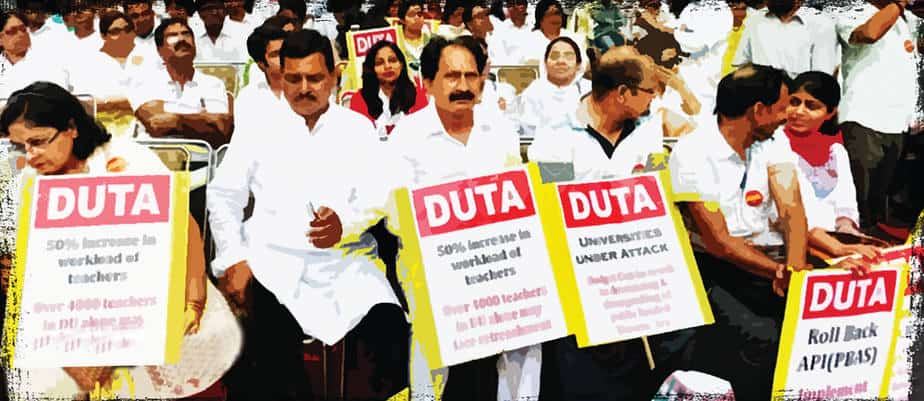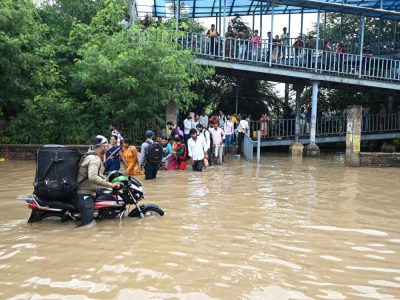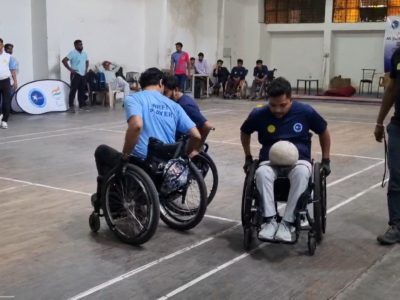With professors continuing their anti-autonomy protest, the evaluation process has been stalled and is affecting final year students
What is the link between the latest Delhi University Teachers’ Association (DUTA) protests and exam paper evaluation? In their latest attempt to draw the attention of the university administration and the University Grants Commission, the teachers have boycotted evaluation of students’ examination sheets.
DUTA has been protesting against the UGC’s proposal to grant autonomy to higher educational institutions.
The teachers’ boycott is on despite the registrar writing to them, urging them to resume the evaluation because it would affect the students severely, particularly final-year students.
In a press release after a meeting on May 23, the DUTA said the evaluation boycott would continue till further notice. The association is also planning a ‘massive hunger strike’ on June 30 and have showed intent to seek political support in the matter.
Rajib Ray, the DUTA president stated that the ongoing protests are the last resort of the teachers as they have been forced to take this path since “the university is being run in an autocratic manner”. DUTA’s demands pertain to some long-standing issues, such as permanency of ad-hoc teachers, pay-parity with all-India services and restoration of MPhil-PhD increments.
The recent agitation comes in the light of grant of autonomy to universities across the country by the UGC. The proposed 30:70 funding formula and the setting up of Higher Education Financing Agency (HEFA) have also been contentious issues.
While these are genuine concerns, the question is whether students and their careers need to be put on the altar?
Over the last academic year, DU has seen major disruptions with frequent suspension of classes as teachers were on strike every now and then. The students bore the brunt in the absence of lectures and mismanagement of class timings.
The students have previously supported DUTA in its march to Parliament and actively responded to the call for suspension of classes. Now, barely two months later, the DUTA seems to have abandoned the same students, leaving their future prospects uncertain.
The evaluation boycott is not new, nor is the teachers’ indifference to students. In 2016 too, the DUTA had boycotted the evaluation, but it later exempted the final-year students. This year, however, there seems to be no saving grace for final-year students too, who are anxious as their applications in various colleges and universities are pending. The mark sheets will be given only when the boycott ends.
In the pursuit of their demands, after years of agitation and little achievement, DUTA seems to have forgotten who is at the centre of the university – the students. DUTA wants to work towards teacher’s welfare and that of the university, but will this welfare come at the cost of students?
The association has not had the best record when it comes to being conscience-keeper of the university, as it is now claiming to be. In the March agitation, there were accusations against DUTA for giving the protest a political touch.
In a Facebook post, Prerna Malhotra, a DU professor, wrote that not just apolitical students were handed AISA-SFI placards, but political figures like Brinda Karat and Sharad Pawar took the centre-stage.
As far as the issue of standing up for ad-hoc teachers is concerned, a Facebook post by Manoj Kumar, an assistant professor, exposed screenshots of the dean’s email to teachers, highlighting how the university has been playing with ad-hoc staff for years. Manoj Kumar said: “Unionism is not bringing down the system, but the university, and its students with it.”
It is a critical time and someone needs to do something about the grave state of affairs in the university, and the DUTA will certainly not do it. It is not behaving like a doctor coming up with a cure, but like a quack coming up with a cure worse than the disease.
This article was first published in Newslaundry.





